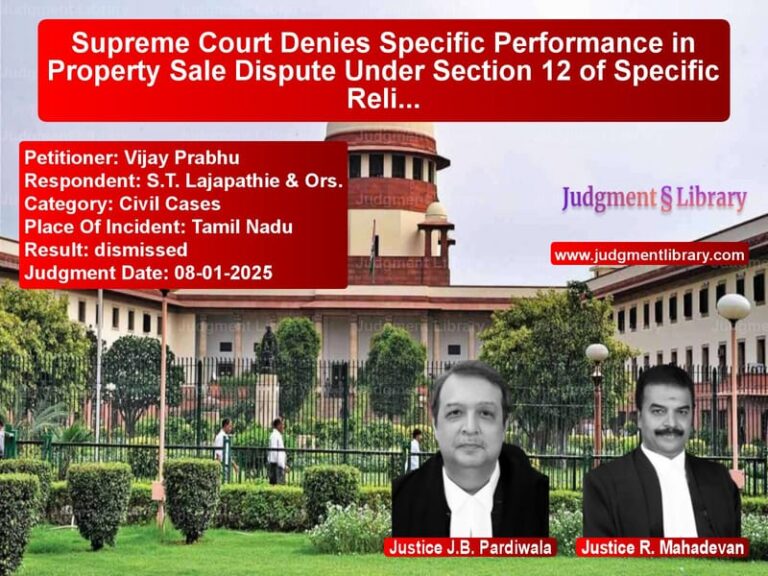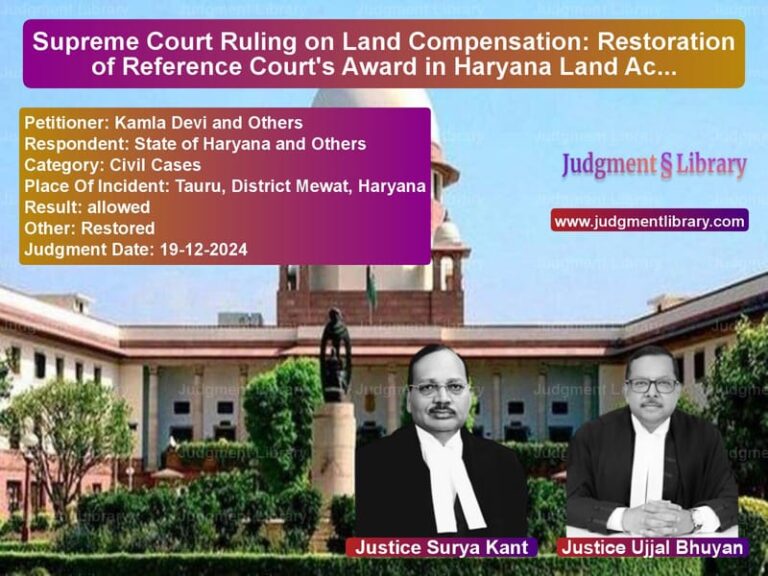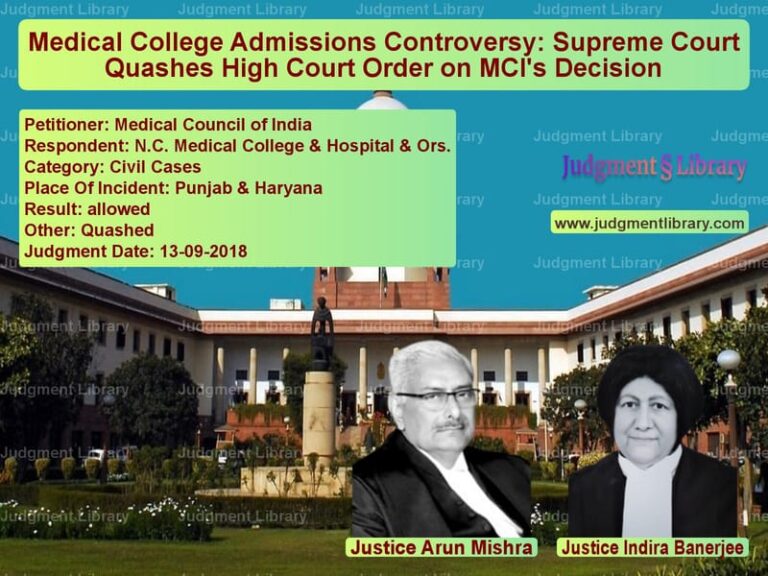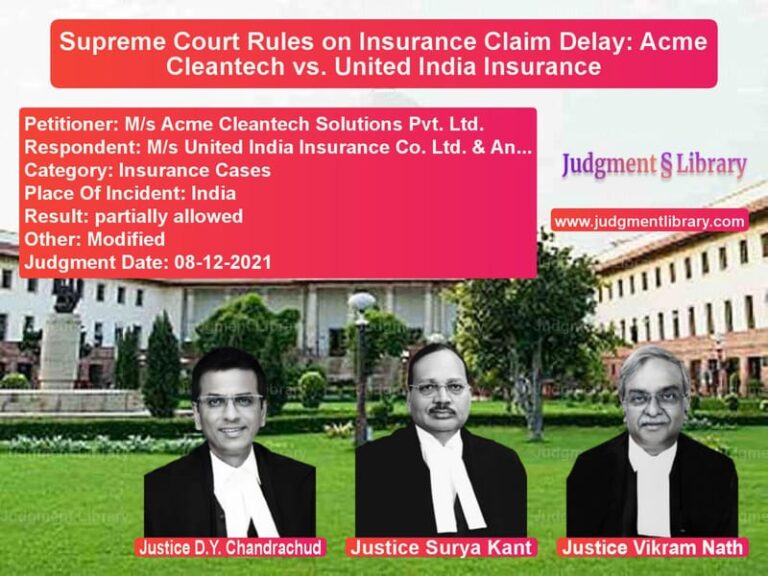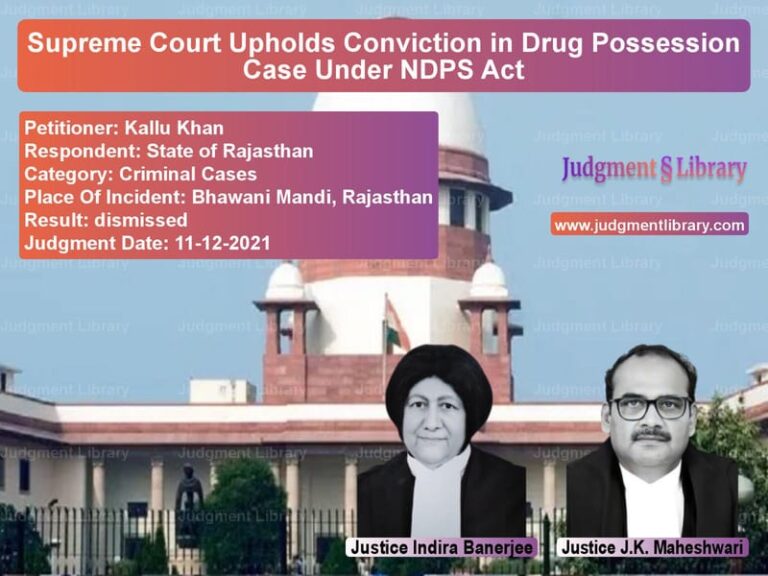Supreme Court Rules on Preferential Right in Agricultural Land under Hindu Succession Act
The Supreme Court of India, in Babu Ram vs. Santokh Singh (Deceased) Through His LRs & Ors., delivered a significant ruling regarding the preferential right of an heir under Section 22 of the Hindu Succession Act, 1956. The primary question before the Court was whether this preferential right extends to agricultural land. The judgment clarifies the scope of succession laws in India, particularly in cases where an heir wishes to transfer inherited property.
Background of the Case
The case revolves around two brothers, Santokh Singh and Nathu Ram, who inherited agricultural land from their father. Over time, Nathu Ram decided to sell his share and executed a registered sale deed on August 19, 1991, in favor of Babu Ram, the appellant.
However, Santokh Singh objected to this sale, claiming that as a co-heir, he had a preferential right under Section 22 of the Hindu Succession Act to acquire the land before any outsider could purchase it. Consequently, he filed Civil Suit No. 194 of 1991 in the Court of Senior Sub-Judge, Hamirpur, seeking a declaration and permanent injunction against the sale.
Trial Court’s Decision
The trial court ruled against Santokh Singh, holding that he did not have an exclusive preferential right under Section 22 of the Act to prevent the sale. The suit was dismissed on May 4, 1994.
Appeal Before the District Court
Dissatisfied with the trial court’s ruling, Santokh Singh appealed before the District Judge, Hamirpur. The appellate court examined the applicability of Section 22 of the Hindu Succession Act, which states that when an heir intends to sell immovable property inherited under the Act, other heirs have a preferential right to acquire it.
The District Court ruled in favor of Santokh Singh, holding that:
- The transfer of land to Babu Ram was null and void.
- Santokh Singh had a preferential right to purchase the land.
- Babu Ram must transfer the land to Santokh Singh upon payment of Rs. 60,000 (the sale consideration).
This ruling effectively nullified the sale deed in favor of Babu Ram.
Appeal Before the High Court
Aggrieved by the District Court’s decision, Babu Ram filed Regular Second Appeal No. 457 of 2002 before the High Court of Himachal Pradesh. The key question framed for consideration was:
“Does Section 22 of the Hindu Succession Act apply to agricultural land, or is its application limited to other immovable properties?”
The High Court, relying on previous judgments, held that Section 22 of the Act applies to agricultural land as well. The appeal was dismissed on May 7, 2018.
Appeal Before the Supreme Court
Babu Ram then approached the Supreme Court, arguing that:
- Section 22 of the Hindu Succession Act does not apply to agricultural land.
- The High Court erred in interpreting the law, as the Act primarily deals with intestate succession and does not govern agricultural land transactions.
- The decision was contrary to prior rulings of various High Courts.
Arguments by the Respondents
The respondents (Santokh Singh’s legal representatives) argued that:
- The Hindu Succession Act applies to all immovable properties, including agricultural land.
- Excluding agricultural land from the scope of Section 22 would defeat the purpose of the Act.
- The lower courts correctly ruled that the sale should be reversed in favor of the co-heir.
Supreme Court’s Observations
The Supreme Court analyzed the legislative framework and previous judgments concerning succession laws and agricultural land. The Court noted the following:
- Under the Government of India Act, 1935, agricultural land was a subject under the Provincial List.
- Post-Independence, the Constitution of India changed this framework, placing ‘intestacy and succession’ under the Concurrent List, while ‘transfer of agricultural land’ remained in the State List.
- Section 22 of the Hindu Succession Act applies broadly to immovable properties inherited under the Act.
The Supreme Court held:
“The preferential right given to an heir under Section 22 of the Act is applicable even if the property in question is agricultural land.”
It further ruled that:
- State laws governing land transactions do not override the principles of intestate succession.
- The concept of preferential right ensures that family property remains within the family.
Final Judgment
The Supreme Court upheld the decision of the District Court and High Court, dismissing Babu Ram’s appeal. The key findings were:
- Section 22 of the Hindu Succession Act applies to agricultural land.
- Santokh Singh had the legal right to claim preferential purchase of the land.
- The sale deed in favor of Babu Ram was null and void.
The Court concluded:
“Various High Court decisions holding otherwise stand overruled.”
Conclusion
This landmark ruling affirms that the preferential right under the Hindu Succession Act extends to agricultural land, preventing co-heirs from selling inherited property to outsiders without offering it first to other heirs. The judgment strengthens the legal position of co-heirs and ensures that ancestral property remains within the family lineage.
Petitioner Name: Babu Ram.Respondent Name: Santokh Singh (Deceased) Through His LRs & Ors..Judgment By: Justice Uday Umesh Lalit, Justice M.R. Shah.Place Of Incident: Hamirpur, Himachal Pradesh.Judgment Date: 07-03-2019.
Don’t miss out on the full details! Download the complete judgment in PDF format below and gain valuable insights instantly!
Download Judgment: Babu Ram vs Santokh Singh (Decea Supreme Court of India Judgment Dated 07-03-2019.pdf
Direct Downlaod Judgment: Direct downlaod this Judgment
See all petitions in Property Disputes
See all petitions in Landlord-Tenant Disputes
See all petitions in Succession and Wills
See all petitions in Judgment by Uday Umesh Lalit
See all petitions in Judgment by Mukeshkumar Rasikbhai Shah
See all petitions in dismissed
See all petitions in Declared Infructuous
See all petitions in supreme court of India judgments March 2019
See all petitions in 2019 judgments
See all posts in Civil Cases Category
See all allowed petitions in Civil Cases Category
See all Dismissed petitions in Civil Cases Category
See all partially allowed petitions in Civil Cases Category



